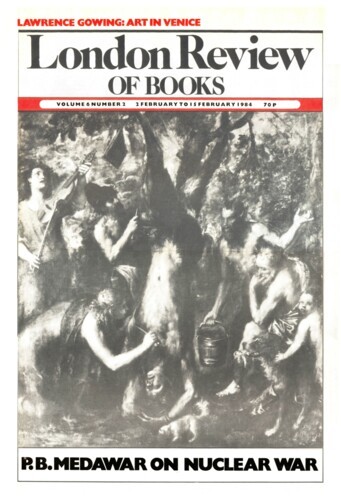Anthony Pagden
Anthony Pagden teaches at UCLA. His most recent books are La ilustración y sus enemigos and, as editor, The Idea of Europe: From Antiquity to the European Union.
Being a benandante
Anthony Pagden, 2 February 1984
In the mountainous district of Friuli in Northern Italy there were good witches and bad, ‘good walkers’ (benandanti) and evil ones. On certain nights of the year during the Ember Days, in the valley of Josaphat, the two met and did battle for the crops. The benandanti came armed with stalks of fennell, the witches and warlocks with sorghum and sometimes the wooden palettes used for cleaning ovens. Ranged like armies with their captains and their banners, they fought all night long. If the benandanti won, then the harvest would be safe, but if the witches won then there would be famine. The benandanti could also on occasion cure the bewitched and protect people’s homes from the vandalism of the witches: as one of them explained, the witches ‘go into the cellars and spoil the wine with certain things, throwing filth into the bungholes’. Unlike the witches, who had sold themselves to Satan in exchange for their supernatural powers, the benandanti, who fought only for ‘Christ’s faith’, were born to their profession. Every man whose mother had preserved the caul (the placenta) in which he was born and wore it about his neck was compelled to ‘go forth’ when called to defend the crops. These night battles did not, however, take place in this world but ‘in the spirit’. The soul alone ‘went out’, sometimes in the form of some small animal, leaving the body behind inert and as if dead. In the morning, before dawn, the spirit returned, but if someone should attempt to turn the body or ‘come and look for a long time at it’, the spirit would never again be able to re-enter its former home and would be compelled to join the horde of those who had died ‘before their time’. Being a benandante was clearly a risky business.
Pieces about Anthony Pagden in the LRB
Double Doctrine: The Enlightenment
Colin Kidd, 5 December 2013
In the course of 15 years teaching history at the University of Glasgow, with between a hundred and fifty and two hundred students in my classes, I inevitably received a few complaints. Some have...
Clashes and Collaborations
Linda Colley, 18 July 1996
How should historians write about empire? Or, if you prefer, the imperial enterprise? The task is made difficult in part because many people still find it easy to confuse academic concentration...
America first
Felipe Fernández-Armesto, 7 January 1993
‘See America first’: the old tourist-office advertising slogan made it sound easy. The most famous moment in the history of exploration, however, is also one of the most baffling. In...
Criollismo
Benedict Anderson, 21 January 1988
New York, Nueva Leon, Nouvelle Orléans, Nova Lisboa and Nieuw Amsterdam – already in the 16th century, Western Europeans had begun the strange habit of naming remote places in the...
The Moral Life of Barbarians
Geoffrey Hawthorn, 18 August 1983
Spain was in doubt about its new dominion in the Antilles. In 1493, the Pope Alexander VI had granted Ferdinand and Isabel the right to conquer and also to enslave the inhabitants of the islands....
Read anywhere with the London Review of Books app, available now from the App Store for Apple devices, Google Play for Android devices and Amazon for your Kindle Fire.
Sign up to our newsletter
For highlights from the latest issue, our archive and the blog, as well as news, events and exclusive promotions.

